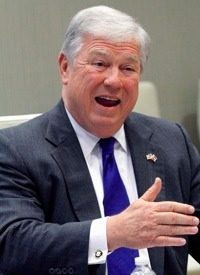
One Mississippi judge, Tomie Green, has stepped in to see what he can do to overturn some of the Governor’s executive clemency warrants, thus far blocking the release of at least 21 of the 26 individuals who were still incarcerated. Responding to Barbour's actions, Mississippi Attorney General Jim Hood said: “It appears from my preliminary review that the vast majority of them would probably be illegal pardons.”
In justifying his actions, Barbour explained that approximately 90 percent of the individuals pardoned “were no longer in custody, and a majority of them had been out for years.” He said that the pardons were intended to assist the former inmates “to find gainful employment or acquire professional licenses as well as hunt and vote.” As for the clemency bestowed on those still incarcerated, Barbour said his decisions were “based upon the recommendation of the Parole Board in more than 90 percent of the cases. The 26 people released from custody due to clemency is just slightly more than one-tenth of one percent of those incarcerated.”
The former Governor pointed out that half of those he released were placed on indefinite suspension for medical reasons “because their health care expenses while incarcerated were costing the state so much money.”
But included among those pardoned by Barbour, reported the Associated Press, were “David Gatlin, convicted of killing his estranged wife in 1993; Joseph Ozment, convicted in 1994 of killing a man during a robbery; Anthony McCray, convicted in 2001 of killing his wife; Charles Hooker, sentenced to life in 1992 for murder; and Nathan Kern, sentenced to life in 1982 for burglary after at least two prior convictions.”
In addition to killing his wife, for which he was serving a life sentence, David Gatlin also shot his wife’s friend, Randy Walker, who survived a bullet wound to the head. “I’m totally disgusted,” Walker said, adding, “I think the governor himself should have to look me and the family in the eye and say, ‘Hey, I’m going to let this guy go.' But there wasn’t any of that. That’s the coward’s way out if you ask me.”
Anthony McCray pleaded guilty in 2001 to killing his wife, Jennifer, at a cafe following an argument. He reportedly left the cafe and returned with a gun, shooting his wife in the back. “It’s very painful for my family that he was released,” asserted Joann Martin, Jennifer McCray’s sister. “When he killed her, she had a three-year-old daughter and a nine-year-old son, who have been raised by my other sister. It’s a shame before God. It’s almost like you kill somebody and nobody cares.”
Barbour also pardoned Joseph Ozment, who was sentenced to life in prison in 1994 for shooting Ricky Montgomery during a robbery with several other men. Montgomery’s nephew, Mark McAbee, called the pardon a “slap in the face,” recalling how one of the other men involved in the robbery “shot my uncle three times. He was crawling toward Joseph Ozment for help. He didn’t know Joseph Ozment was involved…. Joseph Ozment put a gun to his head and pulled the trigger twice.”
At least some of the pardoned murderers had spent part of their sentences working at the Governor’s mansion, a tradition that stretches back decades in the state. Mississippi Corrections Commissioner Chris Epps explained that inmates who work at the Governor’s mansion are often convicted murderers because they are the only ones who serve long enough sentences to earn the trust for such a position.
But “serving your sentence at the Governor’s Mansion where you pour liquor, cook, and clean should not earn a pardon for murder,” wrote one of the Republican Governor’s critics, Democratic Public Service Commissioner Brandon Presley.
P.S. Ruckman Jr., a political science professor who has studied pardons, told Fox News that while many Governors make use of their authority to grant clemency, he was surprised by the number that Barbour issued, and by the types of criminals he chose to set free or provide with an unconditional pardon. “If you look at the percentage of persons who were charged with violent crimes,” Ruckman noted, “it’s pretty high — murder, manslaughter, aggravated assault, rape, statutory rape, vehicular homicide. That’s just not the typical patch of pardons.”
Nonetheless, even as the state’s Attorney General was seeking to overturn many of the pardons on state constitutional grounds, Barbour insisted that he felt “very comfortable” with his decisions. “I am fully confident the pardons and other clemency I have given are all valid,” he told reporters, adding, “I believe in second chances and I try hard to be forgiving. I am very comfortable and totally at peace with these pardons.”
Photo of Haley Barbour: AP Images



